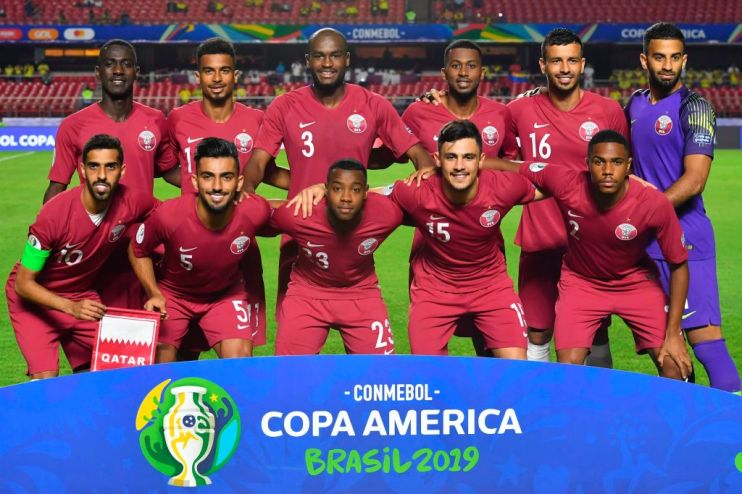Copa America: The reasons behind Qatar’s involvement in South America and what the future holds

There is something odd about the Copa America this summer. In among the usual suspects – hosts Brazil, holders Chile, 15-time winners Uruguay – sits a jarringly incongruous name: Qatar.
The surprise winners of this year’s Asian Cup have travelled 12,000km to play in Group B alongside Colombia, Paraguay and Lionel Messi’s Argentina, who they meet on Sunday night in Porto Alegre.
But what, you might ask, are Qatar doing at a tournament designed to decide the best footballing nation in South America? The answer – like much that surrounds the tiny Gulf state – is complicated.
Read more: Lionesses overcome Japan hurdle but there’s still work to do
At its most basic level, Qatar are there because they were invited by the regional governing body, Conmebol, to take up one of the two guest places in the 12-team tournament.
These invites traditionally go to Mexico and the United States but a schedule clash with the Concacaf Gold Cup effectively ruled out any nations from North and Central America or the Caribbean.
Instead Japan, who took part as guests in 1999, and Qatar were confirmed as invitees over a year ago – long before they would both reach the final of the Asian Cup in February.

Qatar’s presence is also the latest sign of closer ties between the country – currently the subject of a blockade by the United Arab Emirates and some of its allies – and South America.
In October, Qatar Airways announced a four-and-a-half-year deal to sponsor Conmebol and its club competitions, the Copa Libertadores and Copa Sudamericana.
For Qatar’s footballing ambitions, playing in the Copa America is the latest staging post on their journey to becoming competitive in time for their staging of the 2022 World Cup.
It is a target that seemed laughable when the country was controversially named hosts in 2010. Qatar had never qualified for the tournament and only once made it out of the Asian Cup group stage.
But seeds had already been sewn in the form of the high-spec Aspire Academy, founded in 2004 with a view to identifying and cultivating home-grown sports stars.

That project paid off handsomely in the UAE four months ago, when Qatar lifted their first Asian Cup. They won all seven games, claiming the notable scalps of Japan and South Korea, and conceding just once.
Qatar’s breakthrough has come under the stewardship of their Spanish head coach Felix Sanchez, who spent a decade at Barcelona’s famed La Masia academy before being recruited to Aspire in 2006.
In 2013 he was placed in charge of Qatar’s Under-19s and the following year led a team with a spine of Aspire graduates to their first Asian Championship.
Four years later he was handed the keys to a senior team which, until then, had relied very heavily on overseas-born players who had become naturalised Qataris.
Sanchez again drew on the players he had nurtured through the age-group levels and pulled off a huge shock by winning the Asian Cup in the back yard of their current political foes the UAE.
Almoez Ali proved the star of that tournament, topping the goalscoring charts with a new Asian Cup record tally of nine and scoring an audacious overhead kick in the final.
Winger Akram Afif set up 10 of Qatar’s 19 goals. He, Ali and another of the team’s star men, tenacious midfielder Assim Madibo, are all 22 and came through Aspire and the U19s.
Despite the new focus on developing talent, questions about naturalisation have not disappeared entirely.
Four overseas-born players started for Qatar in the Asian Cup final: Sudan-born Ali, defenders Bassam Al-Rawi and Ro-Ro, originally from Iraq and Portugal respectively, and Algeria-born forward Boulalem Khouki.
The UAE lodged a protest at the eligibility of Ali and Al-Rawi after their Asian Cup semi-final defeat to Qatar. It was dismissed by Asian Football Confederation.

Sanchez, 43, favours a fluid attacking style that relies on the pace of his youthful line-up.
While it has proven a success against other Asian sides, it is relatively untested against the greater physicality of European and South American opponents.
In their opening match at the Copa America last weekend they came from two down to draw 2-2 with Paraguay, and on Wednesday they impressed but conceded an 86th-minute goal to lose 1-0 to Colombia. Depending on how they get on against Argentina, they could yet still reach the quarter-finals as a best third-placed team.
Even if they are eliminated the experience has already been invaluable. That is why Qatar’s presence at the Copa America makes perfect sense – for them, at least.
